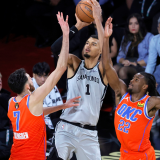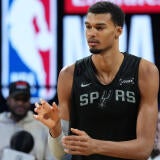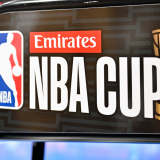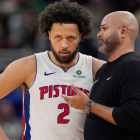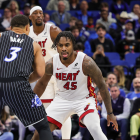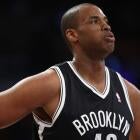How the Timberwolves collapsed down the stretch of Game 2 of the Western Conference finals against Mavericks
It took a series of critical mistakes to blow Game 2

If there was one lesson the Minnesota Timberwolves should have learned by the final minutes of Game 2 of the Western Conference finals, it was that no lead is safe against the Dallas Mavericks. Minnesota raced out to a nine-point first-quarter lead in Game 1. Dallas overcame it by the end of the quarter. Minnesota used an 8-0 run midway through the fourth quarter to take a four-point lead with 3:37 remaining. Dallas won the game by three. Minnesota led by 18 in the first half of Game 2. Dallas regained the lead early in the fourth quarter.
Still, when you're up by five with 1:29 remaining at home, you tend to feel relatively safe. At that moment, ESPN's win probability metric gave Minnesota an 86.7% chance to win. That is by no means a lock, but the No. 1 defense in the NBA should feel relatively safe under those circumstances. Worst case, it has a young star who's been drawing Michael Jordan comparisons to bail them out... right?
Wrong.
In 89 seconds, a five-point lead turned into a stunning one-point defeat, and it came through the failures of the very things that got Minnesota here in the first place. The NBA's best defense made critical mistakes on two key possessions. Anthony Edwards made two huge errors of his own. Now, the Timberwolves are two games away from elimination with two games on the road ahead.
Here's how it all happened, starting with a single defensive adjustment that came back to bite them:
When Dereck Lively comes up to set the action's initial screen for Luka Doncic, Jaden McDaniels (initially guarding Doncic) and Kyle Anderson (initially guarding Lively) switch. The Timberwolves are not a switch-heavy defense. Their base defense emphasizes drop coverage in order to maximize Rudy Gobert's rim-protection, and their primary adjustment in Game 2 was to blitz, or have both defenders in the pick-and-roll action double up Doncic.
So why did Minnesota switch? Because it was up five and thinking about the clock. The Wolves' goal on that possession, above all else, was to prevent a 3-pointer. That is what switching does best. Even if it allows mismatches (a topic we'll return to!), it ensures that everybody on the floor is well-defended. As a result, theoretically, nobody should get a clean look from 3-point range.
Instead, Doncic passed to Irving, who collapsed the defense with a drive. Both McDaniels and Mike Conley moved to the rim to help. This forced the Timberwolves into rotation on Irving's pass. When the ball swung back to Doncic, both Anderson and Edwards descended upon him. McDaniels stayed in the lane to prevent the line drive pass into Lively, which Doncic made a few times earlier in the game on doubles, while Conley tried to split the difference between guarding the 3-point line and jumping a possible passing lane into Lively. The result is that neither can scamper over to Irving in the corner in time. He then made a 3-pointer to cut the lead down to 108-106.
Still, it was a two-point game and Minnesota had possession, so there was no need to panic. The only thing that would kill the Timberwolves was a turnover. Well...
Edwards fired a pass far too high for McDaniels and it went out of bounds. Replay showed that Irving fouled him on the play, but that is not reviewable, and possession is awarded to Dallas. Ultimately, it would have been a bailout whistle for Minnesota, because it was a pass Edwards shouldn't have made.
This was, above all else, a case of Edwards' inexperience winning out. Doncic, now in his sixth season and fourth playoff run, has seen enough doubles to know how to handle them in moments like this. Edwards, still only 22 and playing beyond the first round for the first time, has not.
When Edwards used an Anderson screen, Lively joined Derrick Jones Jr. on him. When he tried to step toward the corner, Irving replaced Jones. Edwards paniced and made a desperate pass that resulted in the turnover.
There wasn't a great pass on the board. Everything was covered, and unlike Minnesota, Dallas remained disciplined within its defensive scheme. The only real choice Edwards had was to pass to Anderson on that initial double. That wouldn't have been ideal, but Anderson is at least a high-level passer that can draw help on drives.
Perhaps he could have given Naz Reid enough room to fire off a 3-pointer, but ultimately, it was Edwards recklessly driving into doubles that caused this turnover. The same thing happened on Minnesota's next trip down the floor, still leading by two.
This time, Dallas didn't throw a hard double at Edwards. Jones hedged slightly, but eventually fell into the paint to recover onto Gobert. That action put Edwards, a fast guard, one-on-one against Lively, a rookie center, on the perimeter. Predictably, Edwards got a step. The problem was that he didn't realize it quickly enough.
If you pause the video with roughly 16.5 seconds remaining, then you'll see that Edwards had a clean look at a mid-range jumper, and had every reason to take it. The shot-clock meant that Dallas would get the ball back no matter what. There was no incentive to continue draining the clock. Edwards just got greedy, and it backfired. His stop and spin move gave Lively time to recover. He then needlessly put himself in the air without a shot available to him. It forced him to rush a pass to Reid, who at that moment was trying to move to give him a bailout going in the other direction. Once again, the pass went out of bounds.
All of this led to a single possession with 12.8 seconds left in the game. Doncic made the most of it with a step-back dagger for the lead over Gobert.
Gobert may have been the defender on the play, but this wasn't his fault. No, the blame here rests with either Micah Nori or Chris Finch, whoever made the decision to have Gobert on the floor in the first place. Dallas called a timeout before this play, giving Minnesota a chance to put any five players it wanted on the floor.
He is certainly one of Minnesota's five best defenders, but once again, the Timberwolves elected to run a switch-everything defense to theoretically prevent a 3-pointer. This still made sense. The Timberwolves had a timeout. If they could just limit Dallas to two points, they were guaranteed an overtime as their worst-case scenario. They also could potentially draw up a game-winner of their own on the other end of the floor. As strong a defender as Gobert is near the rim, he is, at best, unspectacular on the perimeter. By putting him on the floor rather than a perimeter defender like Nickeil Alexander-Walker, Minnesota gave Doncic the chance to pick out his preferred dance partner. He chose Gobert and went to work.
Doncic immediately put Gobert on skates. He then went left and Gobert overcommitted to try to take away the drive. This is where he does perhaps deserve some blame. Doncic's tendencies are well known. He's beaten plenty of teams with that step-back 3-pointer, and he's even hit a game-winner with it before. Gobert had been isolated on Doncic on the perimeter in the past. He also knew the score and time. Giving a step to Doncic on the drive might have given him a clearer path to the rim, but a 2-pointer would have only tied the game, and if he passed out to another 3-point shooter because of help, at least it would've been a less threatening option. Instead, Gobert never recovered from that initial mistake. Doncic crossed back over right and stepped back. Swish.
Minnesota managed to create about as clean a look as it could have hoped for on its own final possession: a relatively open 3-pointer for Reid, who had already made seven in the game. He couldn't connect for an eighth triple, and the Mavericks are now two games away from the NBA Finals.



